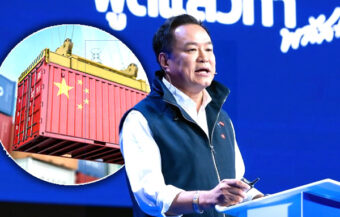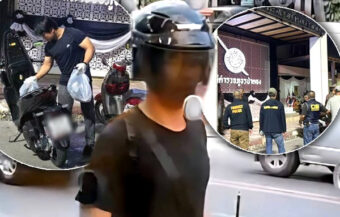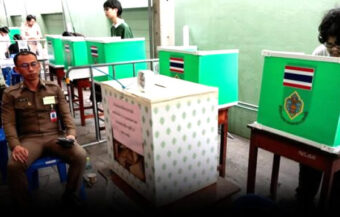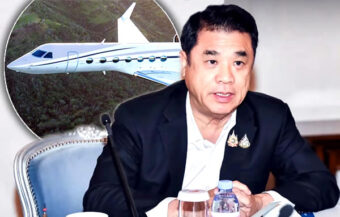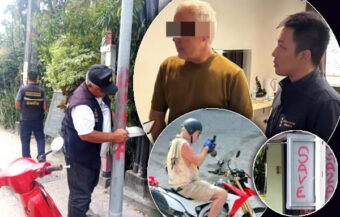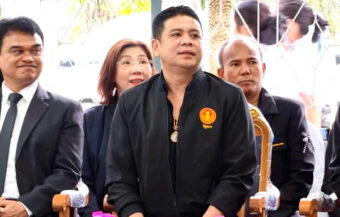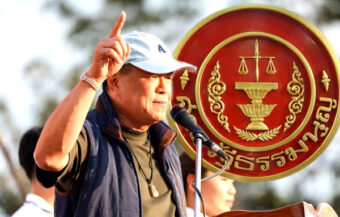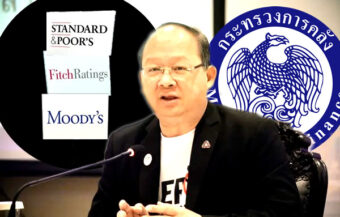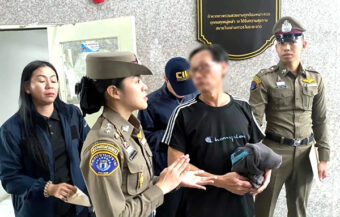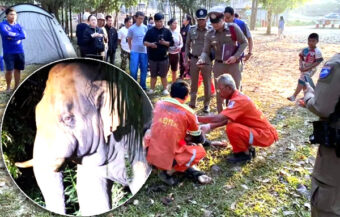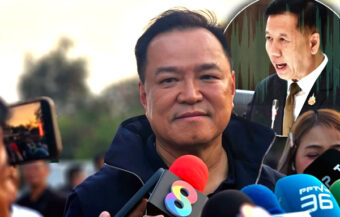Thailand’s new Prime Minister Anutin and his conservative cabinet were sworn in before the King and Queen amid political turmoil, economic instability and urgent pressure to deliver reforms, revive tourism, stabilise agriculture and protect public services.
Thailand’s new Prime Minister took his oath at Dusit Palace in Bangkok on Thursday evening. The conservative, pro-establishment interim cabinet was secured with the backing of the progressive People’s Party. Mr. Anutin’s appointment hinges on delivering an early election next year and a referendum to kick-start rewriting the 2017 Constitution. This is the second cabinet in just three months and comes at a time of severe political and economic turbulence, which could spiral out of control.
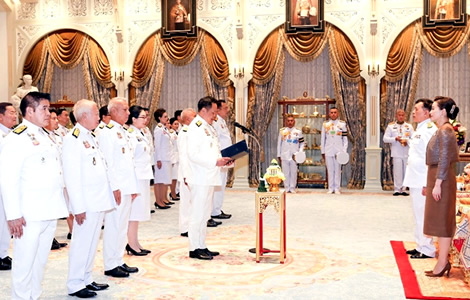
On Wednesday, September 24, 2025, Prime Minister Anutin Charnvirakul and his new Cabinet were sworn in at Amporn Sathan Throne Hall, Dusit Palace. King Maha Vajiralongkorn and Queen Suthida personally presided over the ceremony, marking the second cabinet swearing-in in three months. This followed the July installation of former Prime Minister Paetongtarn Shinawatra’s second Cabinet.
Notably, Paetongtarn, who had been suspended, appeared in the hall as the newly appointed Culture Minister. She was formally dismissed by the Constitutional Court on August 29, ending her tenure as Prime Minister.
Consequently, Anutin assumed office in a politically tense environment. Analysts note that the transition did not calm political turbulence.
King’s guidance and cabinet structure set the stage for government tasked with leading Thailand in crisis
Following the ceremony, Prime Minister Anutin acknowledged being deeply moved by the King’s address. His Majesty urged the Cabinet to be mentally strong, diligent, and intelligent. He emphasised the need to overcome obstacles and to serve the country with wisdom and integrity. Accordingly, the Cabinet now faces immediate expectations to deliver measurable results.
Prime Minister Anutin has divided responsibilities among six Deputy Prime Ministers. Each has been assigned multiple ministries and agencies to ensure governance is effective and coordinated. Bowornsak Uwanno, Deputy Prime Minister for Legal Affairs, oversees the Ministry of Justice, Ministry of Culture, the Office of National Strategy Reform and Reconciliation, the Cabinet Secretariat, Office of the Council of State, Royal Society, Civil Service Commission, Civil Service Development Commission, National Office of Buddhism, Special Case Committee, and Narcotics Control Board. Therefore, he will manage both legal and cultural reform agendas simultaneously.
Ekniti Nitithanpraphat, Deputy Prime Minister and Minister of Finance, oversees the Ministry of Finance, the Ministry of Commerce, and the Budget Bureau. However, matters under the Prime Minister’s Budget Procedures Act remain outside his authority. This delineation aims to prevent administrative overlap while ensuring fiscal responsibility.
Deputy prime ministers assigned extensive portfolios to manage critical ministries and oversee policy
Thammanat Prompao, Deputy Prime Minister and Minister of Agriculture and Cooperatives, has been tasked with the Ministry of Tourism and Sports, the Ministry of Agriculture and Cooperatives, Ministry of Social Development and Human Security, and Ministry of Education. Additionally, he chairs the National Tourism Policy Committee, National Fisheries Policy Committee, Sports Authority of Thailand, National Sports Policy Committee, National Sports Development Fund Management Committee, and Farmer Rehabilitation and Development Fund Committee. Consequently, Thammanat’s portfolio spans agriculture, tourism, sports, and rural development.
Pipat Ratchakitprakarn, Deputy Prime Minister and Minister of Transport, oversees the Ministry of Transport, the Ministry of Digital Economy and Society, Ministry of Energy, the National Cybersecurity Agency, and the Eastern Economic Corridor Policy Committee. Sophon Saram, Deputy Prime Minister, manages social affairs, including the Ministry of Labour, the Ministry of Higher Education, Science, Research and Innovation, Ministry of Public Health, the Office of the Consumer Protection Board, the Office of National Water Resources, and related offices under the Prime Minister’s Office.
Suchart Chomklin, Deputy Prime Minister and Minister of Natural Resources and Environment, oversees environmental policy and industrial regulation. Meanwhile, Pradon Prisananantakul, Minister of the Prime Minister’s Office, manages the National Water Resources Office, Budget Bureau, Digital Government Development Agency, and National Village and Urban Community Fund Office. Therefore, resource management and digital governance fall under his direct supervision.
Cabinet includes specialised ministers to oversee key public services and strategic national programmes
Other ministers with specialised portfolios include Supamas Isaraphakdi, overseeing the Public Relations Department and MCOT Public Company Limited, and Naphin Srisanpang, managing the Thailand Convention and Exhibition Bureau, Pinkanakorn Development Office, Creative Economy Agency, Office of Small and Medium Enterprises Promotion, and Office of Social Enterprise Promotion. Santi Piyatat oversees the Consumer Protection Office, Office of National Reform, Strategy and Solidarity, and Office of Knowledge Management and Development.
The Cabinet also contains key figures in defence, finance, foreign affairs, and interior. General Nattapol Nakphanit serves as Minister of Defence, supported by Lieutenant General Adul Boonthamcharoen as Deputy Minister. Woraphat Thanyawong is Deputy Minister of Finance. Sihasak Phuangketkaew heads the Ministry of Foreign Affairs, while Atthakorn Sirilathayakorn oversees Tourism and Sports. Akara Prompao leads Social Development and Human Security, and Surasak Pancharoenworakul is Minister of Higher Education, Science, Research, and Innovation.
Prime Minister Anutin retains the Ministry of Interior, assisted by three deputy ministers: Songsak Thongsri, Sakda Wichiensilp, and Sasithorn Kittithorakul. Police Major General Rutthaphon Naowarat serves as Minister of Justice, Trinuch Thienthong is Minister of Labour, and Sabida Thaiset heads the Ministry of Culture. Narumon Pinyosinwat leads the Ministry of Education, assisted by Deputy Minister Ong-art Wongprayoon.
Cabinet oath-taking witnessed by the King emphasises accountability and prioritises urgent economic issues
Phatthana Promphat and Worachot Sukonkhajorn head Public Health, Thanakorn Wangboonkhongchana and Petty Officer 1st Class Yotsingh Liamlert oversee Industry.
The Cabinet’s oath-taking occurred under close royal observation. Secretary-General to the Cabinet Natcharee Anantasin was present. The King delivered a considered royal address, urging diligence, mental fortitude, and intelligence. He instructed ministers to overcome obstacles and fulfil duties with skill and integrity. His message emphasised immediate accountability and strategic planning.
The Cabinet now faces several urgent challenges. Economic priorities include managing energy prices, inflation, and public debt. The government must also boost tourism, agriculture, and industrial output.
Social responsibilities include improving education, public health, and rural welfare. Security and public order remain critical, particularly in combating illegal drugs and ensuring consumer protection.
Prime Minister’s policy statement will define priorities and test cohesion across ministries and factions
Prime Minister Anutin will deliver his policy statement to Parliament on September 29. The statement will define legislative priorities and provide clarity on governance strategy. Analysts expect the speech to outline immediate reforms, fiscal plans, and policy coordination among ministries. Therefore, the statement is seen as a crucial test of the Cabinet’s cohesion and effectiveness.
The government has clearly structured responsibilities to ensure efficiency. Each deputy prime minister oversees multiple sectors, avoiding administrative bottlenecks. This approach is intended to improve accountability and streamline decision-making. Analysts suggest that successful execution will depend on disciplined coordination and clear lines of responsibility.
Coalition politics remain a critical concern. Anutin’s government relies on a mix of party and military-aligned support. Consequently, balancing political factions within Parliament will require skilful negotiation and strategy. Cabinet members must cooperate closely to prevent disagreements from derailing policy implementation.
Cabinet inherits key programmes and faces urgent economic problems alongside constitutional reform
Furthermore, the Cabinet inherits ongoing initiatives from previous administrations. Infrastructure development, social programs, and regulatory reforms will continue under the new government. Continuity in these programs is vital to maintaining public confidence and ensuring progress in economic and social development.
The Cabinet’s composition reflects both experience and political strategy. Ministers and deputies bring expertise in law, finance, industry, social welfare, and governance. Their overlapping portfolios, while extensive, are structured to maximise output and ensure accountability. Analysts note that the ability of ministers to manage complex portfolios will be decisive in the government’s early performance.
In addition, the King’s guidance emphasises ethical governance and strategic foresight. His remarks signal high expectations for both short-term performance and long-term national planning. Cabinet members are expected to adhere to principles of integrity while executing clearly defined policy initiatives.
The government’s immediate task includes responding to domestic economic pressures. It is also tasked by the country’s biggest party, the People’s Party, with pursuing a constitutional reform referendum.
The 2017 Constitution has been a decisive factor in plunging the kingdom into a consistent state of political stability since the 2023 General Election. In short, it was designed by the former military junta that took power in 2014 to safeguard the ambitions of military-aligned officials against visionary politicians. This was introduced on the basis of fighting corruption and the undue influence of any one person on the country’s politics.
It is a recipe for disaster and stifles bold and effective leadership. Indeed, it was written with the political ghost of Pheu Thai de facto leader Thaksin Shinawatra in mind.
Ailing economy and urgent tourism recovery require coordinated ministerial action and intervention
In the meantime, the ailing economy, hit by political instability, a lack of liquidity, and currency volatility, needs urgent action. The recovery of the falling foreign tourism industry will also require the urgent attention of ministers.
Ministries are tasked with developing actionable solutions that balance fiscal responsibility with public welfare. The new cabinet comes into being on the day Fitch, the ratings agency, downgraded Thailand’s sovereign rating outlook from stable to negative.
New cabinet to be sworn in at Dusit Palace in Bangkok on Wednesday September 24th before the King
New cabinet members solemn oath-taking ceremony before the King and Queen at the Dusit Palace
Likewise, rural development programs under Deputy Prime Minister Thammanat Prompao’s supervision aim to stabilise agricultural income and improve social services.
In summary, the swearing-in of Prime Minister Anutin Charnvirakul’s Cabinet marks a new era of turmoil in Thai politics. The government is only expected to be in power for eight to ten months. This is because an election is due in March or April 2026, with a new government possibly taking power in June.
The coming weeks, including the September 29 policy statement, will reveal how effectively this Cabinet can navigate immediate challenges and achieve its short-term governance objectives.
Join the Thai News forum, follow Thai Examiner on Facebook here
Receive all our stories as they come out on Telegram here
Follow Thai Examiner here
Further reading:
Anutin planning eight-month economic programme as his PM tenure will extend to the next government
2nd Army chief warns Acting PM Cambodian regime cannot be trusted and that border must stay closed

